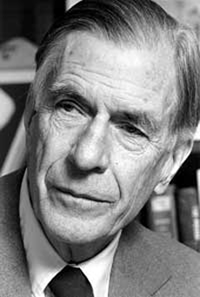
- John Kenneth Galbraith: His Life, His Politics, His Economics
- Farrar, Straus and Giroux
John Kenneth Galbraith died almost exactly a year ago, at the age of 97.
Galbraith had been a presence in North American politics since the 1930s, but seemingly a fading one. He had been dismissed as a "Keynesian liberal," a relic of the Depression and war years and no longer relevant. Younger economists had passed him by, promoting newer, more scientific ways of applying economics to create and maintain prosperity.
This was an opinion Galbraith did not share, and for the last 30 years of his life he maintained a cheerful guerrilla war against his younger colleagues and the politicians who listened to them. Economist Richard Parker has now published John Kenneth Galbraith: His Life, His Politics, His Economics. He argues that while Galbraith lost some skirmishes, his war was more successful than most realize. He was also one of the most influential Canadians of the 20th century.
Born in rural Ontario in 1908, Ken Galbraith seemed headed for, at best, a modest career in agricultural economics and teaching. But having graduated from Ontario Agricultural College (now the University of Guelph), he applied for a fellowship at Berkeley, got it, and launched himself into a career as an academic, writer, bureaucrat, diplomat and political adviser to presidents.
He was a hard person to ignore during much of his early career. At six foot eight, he loomed over everyone. As a convert to the economic ideas of John Maynard Keynes, he influenced his colleagues in New Deal Washington. Then, running the Office of Price Administration during the Second World War, Galbraith helped to keep the revived U.S. economy from running into crippling inflation.
Casualty of a civil war
But he finally had to leave that job after constant attacks from the corporations he was trying to control. As Parker makes clear, the present battle between conservatives and liberals is nothing new. The conservatives fought FDR every step of the way through the Depression, and they fought him through the war as well. More than once, Galbraith was a casualty of that fight.
The economic civil war would go on for decades, and the conservatives began to win in 1973 when Nixon dismantled the Bretton Woods agreement and set the world on a dangerous new course -- masked as "Keynesian."
Later Republicans like Ford and Reagan would stick to that course, and by the time Clinton arrived, the U.S. was locked into a deeply unbalanced economic system: enormous government spending on the military had not been factored into the American economy since Ike left office warning about the military-industrial complex.
Economics as messy politics
As a postwar academic at Harvard, Galbraith argued that the concept of the ideal free market was a delusion. Instead of free individuals with perfect knowledge, exercising free choice, the market was the outcome of "countervailing power": government, corporations and labour were a form of checks and balances.
His ideas were unwelcome not only to the corporate conservatives but to economists who wanted their discipline to be a science based on mathematics. An economy run by messy political processes was very unattractive.
Galbraith further annoyed his colleagues by making his points in books and articles that any reasonably educated person could read and understand. He sold millions of copies of books like American Capitalism, The Affluent Society, and The New Industrial State. The expressions he coined, like "conventional wisdom," entered the language as useful concepts.
He didn't confine his ideas to print. In the 1970s he starred in a BBC TV series, The Age of Uncertainty, explaining the history of economics to millions who would never pick up a book.
The funniest Canadian since Leacock
Even more infuriatingly, Galbraith was funny -- probably the funniest Canadian-born writer since Stephen Leacock (also an economist).
He was funny on every level from the throwaway line (he once described a very young Chinese girl as being "of negligible age") to the satirical novel (an economics professor who becomes incredibly rich by investing against every economic fad). He ridiculed the great men of his age, and included himself among both the great and the ridiculous.
The cap on Galbraith's annoying traits was that he repudiated Disraeli's consoling promise: "While there is death, there is hope." Retirement from Harvard at 67, in 1975, scarcely slowed him down. He published five books and countless articles in his '80s, and his last book, a memoir called Name-Dropping, appeared when he was 90. In his last decade he continued to write and speak as a committed public intellectual.
Parker's biography is also an economic and political history of the United States, and an intellectual history of economics itself. Too often that history resembles the theological conflicts of Protestants and Catholics or Shias and Sunnis. We are all collateral damage in those religious wars, survivors (barely) of Nixon's corruption of Keynesian ideas, Milton Friedman's monetarism, and a host of other sectarian solutions to the problems the last sectarians created.
Galbraith lived to see them all discredited, and his own views gradually regaining respect. This book shows why Galbraith won in the end. He wasn't just too tall, too smart, too clear, too irreverent and too funny. He was also too right.
Related stories:




